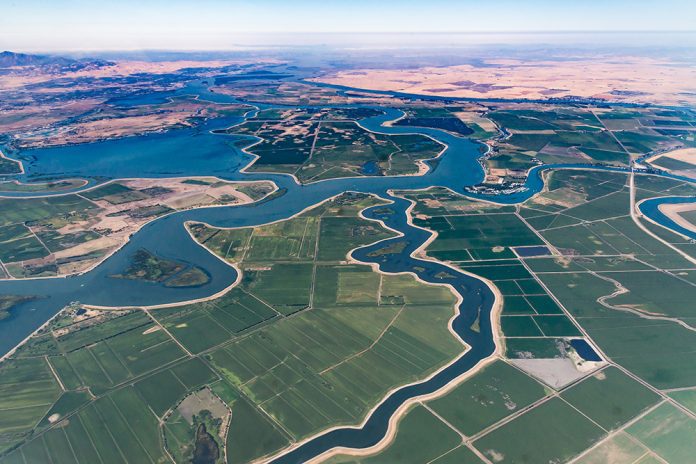
When the California Legislative session began last January, farmers were facing formidable efforts to upend our system of water rights. Four different pieces of legislation took direct aim at the stability that water rights provide to farms, cities, businesses, rural communities and the environment. Each entity must make plans based on how much water will be made available to them, and it’s our system of water rights that makes planning possible.
Taken together, this legislation would have handed wide-ranging powers to the State Water Resources Control Board, stripping away many of the checks and balances on the system and undermining due process for water rights holders. These bills would have empowered the Board to adopt sweeping and permanent regulations, not just emergency orders, and put the burden of proof on water rights holders to defend their existing claims.
Given the makeup of the California legislature, with nearly a third of the legislators in their first term, the possibility of stopping these changes seemed challenging at best as the session began. However, a formidable coalition, including agriculture, public water agencies, the business community, and labor organizations, came together and succeeded in stopping, or significantly modifying, these serious threats.
At the time this article is being published, two of these bills have been amended to address the concerns of many, though not all, legal and policy experts in the coalition, and both may see further amendments when the legislature returns in mid-August. The other two pieces of legislation failed to get out of committee and are now considered two-year bills which will be worked on again next year.

Summaries of Legislation
Assembly Bill 460
While the bill’s stated intent was to make it easier for the State Water Board to discourage, and stop, illegal water diversions, it went much further than needed. The powers granted the Board would have allowed it, or interested third parties, to halt water diversions while limiting constitutionally protected rights to judicial review. The State Water Board would have been able to immediately issue an interim relief order before holding a hearing if it made certain findings. According to one opposition letter, AB 460 “would have the State Water Board serve as prosecutor, judge, jury and executioner in deciding whether an interim relief order is warranted.” The bill would have allowed an interim relief order to remain in place for six months, an entire irrigation season, and deprived water rights holders of meaningful and timely judicial or administrative review.
This bill was stopped in committee and will be discussed again next year.
Assembly Bill 1337
This legislation sought to provide a vast expansion of the State Water Board’s curtailment authority, giving it power to curtail diversions of all water users, including riparian and pre-1914 water rights holders, in “all hydrologic conditions.” It would further have allowed the State Water Board to do by regulation what it currently can only do by adjudication. Opponents of the bill claimed, “AB 1337 proposes no less than to strip every water right holder in California of their state and federal constitutional guarantee of due process.” For the system to be fair, there must be a process for impacted parties to provide evidence and be heard by a neutral arbiter, and AB 1337 would have taken that away.
This bill was stopped in committee and will be discussed again next year.
Senate Bill 389
Flipping our justice system on its head, this bill would assume someone is guilty until proven innocent, instead of the other way around. It would have authorized the State Board to “drag any water rights holder before the Board to defend its claim of right. . . would stack the deck against all right holders forced into these proceedings by providing minimal due process protections and placing the burden of proof on the right holder.” It would have also authorized the State Water Board to conclude water rights have been forfeited even without a conflicting claim as is the case under current law. This would have pushed water users to consume as much water as possible to reduce the risk of forfeiture at the exact time when the State should be encouraging greater conservation.
This bill has been amended to clarify the authorities of the State Water Board, making them consistent with some legal experts’ perception of existing case law. After the legislation was amended, several organizations in the coalition shifted their opposition to a “watch” position. It will be considered by the Assembly Appropriations Committee when the legislature returns in mid-August.
Assembly Bill 676
Claiming to strengthen the directive that the highest use of water in California is for domestic purposes and the next highest use is for irrigation, what it really would have done is add confusion and create litigation risk. By statutorily adopting existing regulations and case law, AB 676 would have opened the door for uncertainty in one of the few areas of water law that is relatively clear.
This bill has been amended to clarify existing regulations in statute and coalition opposition has been removed. It will be considered by the full Senate when the legislature returns in mid-August.
While much work remains to be done, the achievements this legislative session cannot be understated. At a time when farms and farmers seem to be continuously under attack, this coalition effort presents a bright spot in a sometimes-daunting landscape of challenges.
Coalition partners:
Association of California Water Agencies
California Building Trades Association
California Business Properties Association
California Alliance for Jobs
California Chamber of Commerce
California Manufacturers & Technology Association
California Municipal Utilities Association
Friant Water Authority
Kern County Water Agency
Kings River Conservation District
Northern California Water Association
San Joaquin River Exchange Contractors Water Authority
San Luis & Delta-Mendota Water Authority
Southern California Water Coalition
Valley Ag Water Coalition











